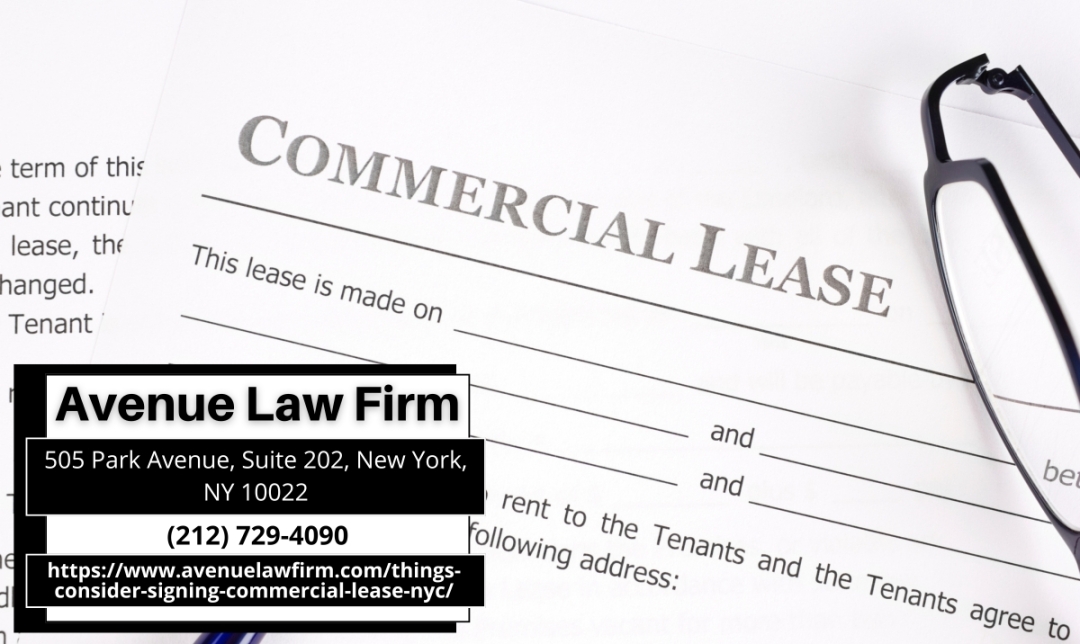NYC commercial real estate attorney Peter Zinkovetsky (https://www.avenuelawfirm.com/things-consider-signing-commercial-lease-nyc/) of Avenue Law Firm outlines critical factors that business owners should evaluate before signing a commercial lease, emphasizing the long-term impact a lease can have on a company’s success. Leasing a commercial space in New York City is a major commitment, and business owners must carefully assess key terms to avoid costly mistakes.
As an NYC commercial real estate attorney, Peter Zinkovetsky emphasizes that commercial leases differ from residential agreements. Unlike residential leases, which are governed by various tenant protections, commercial leases in New York rely heavily on the terms negotiated between the landlord and tenant. “In plainer terms, the courts will not be sympathetic to issues arising out of your failure to thoroughly read and understand the terms of your commercial lease,” explains Zinkovetsky. This makes legal review an essential step in the leasing process.
Many business owners, particularly those new to commercial leasing, may overlook certain contractual provisions that could impact their financial and operational stability. NYC commercial real estate attorney Peter Zinkovetsky stresses that aspects such as rent provisions, repair responsibilities, and lease renewal terms require careful scrutiny. Failing to address these issues upfront could lead to unexpected costs and legal complications down the line.
NYC commercial real estate attorney Peter Zinkovetsky highlights several critical factors that tenants must review before finalizing a lease agreement. One of the most important steps is defining business needs and budgeting accordingly. Commercial space must not only fit a business’s current operations but also allow for future growth. Additionally, understanding market trends is key, as location, accessibility, and rental costs can significantly impact business success.
Lease terms should be carefully reviewed, as they define tenant rights and responsibilities throughout the rental period. Zinkovetsky advises that tenants should seek clarification on rent escalation clauses, which dictate future rent increases, as well as any additional financial obligations such as property taxes and maintenance fees. Some landlords may offer rent concessions, such as covering the first month’s rent or providing allowances for tenant improvements, but these must be documented properly to avoid disputes.
Another crucial aspect is understanding maintenance and repair responsibilities. Unlike residential leases, commercial tenants are often responsible for property upkeep. Zinkovetsky warns that leases frequently contain “as is” clauses, meaning tenants assume responsibility for any necessary repairs unless explicitly stated otherwise. “It is paramount that you understand your obligations and have a financial plan for dealing with potential emergency maintenance that you may be held responsible for,” Zinkovetsky advises.
Effective lease negotiation can help tenants secure more favorable terms. Peter Zinkovetsky encourages business owners to address key concerns before signing, such as subleasing rights, renewal options, and restrictions on property use. Some commercial leases prohibit subleasing altogether, while others require landlord approval, often with additional fees attached. Understanding these clauses upfront can prevent conflicts later on.
For businesses planning long-term operations in one location, renewal options should be clearly outlined. Moving can disrupt operations and client relationships, making it crucial to negotiate a lease that allows for extensions on reasonable terms. Additionally, tenants should be aware of any restrictions on signage, renovations, or business hours that may affect daily operations.
In the event of a contract dispute, tenants must also understand the resolution process outlined in their lease. Some agreements require mediation or arbitration before legal action, while others specify financial penalties for early lease termination. Zinkovetsky advises that tenants ensure all terms are clear and fair before committing to a long-term lease.
Signing a commercial lease is a long-term commitment that requires careful planning and negotiation. NYC commercial real estate attorney Peter Zinkovetsky urges business owners to seek legal assistance to avoid common pitfalls and secure lease terms that align with their business goals. Consulting with a knowledgeable attorney can help tenants identify potential risks, clarify legal obligations, and negotiate better terms to protect their financial interests.
Business owners considering a commercial lease in New York City can benefit from professional legal guidance to facilitate a smooth leasing process. Avenue Law Firm can provide tailored legal assistance to help clients manage complex lease agreements and safeguard their business interests.
About Avenue Law Firm:
Avenue Law Firm is a trusted legal practice in New York City, offering comprehensive real estate legal services. Led by Peter Zinkovetsky, the firm can assist business owners, investors, and property managers in handling the complex aspects of commercial real estate transactions. With a focus on protecting client interests, Avenue Law Firm can provide legal support in lease negotiations, contract reviews, and real estate litigation.
Embeds:
Youtube Video: https://www.youtube.com/watch?v=8jFxc4v8hdQ
GMB: https://www.google.com/maps?cid=14223199020890935024
Email and website
Email: peter@avenuelawfirm.com
Website: https://avenuelawfirm.com/
Media Contact
Company Name: Avenue Law Firm
Contact Person: Peter Zinkovetsky
Email: Send Email
Phone: (212) 729-4090
Address:505 Park Ave Suite 202
City: New York
State: New York 10022
Country: United States
Website: https://avenuelawfirm.com/

